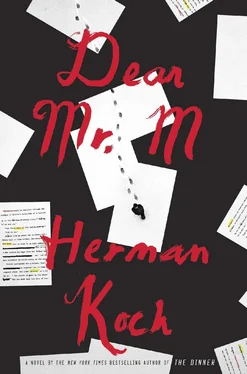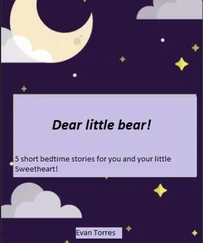But I did none of that. I fell silent. I kept my mouth shut. I looked at you in a way I had never looked before. The way you rarely look at people. Maybe at those closest to you, the woman asleep beside you in bed, your child napping in the crib.
So this is it, I thought. This is what the world looks like once you, Mr. M, are no longer around.
The back of your head was leaning against the headrest; at that moment, for those few minutes (or was it more, fifteen minutes, perhaps?), you existed only in your work. In the work you’d left behind; nothing more would be added, the readers would have to make do with this.
“Well, she’s back asleep.” I hadn’t heard your wife come in. “Would you like another beer, Herman?”
I raised a finger to my lips and nodded at your motionless form in the chaise longue.
“Aw,” your wife said, tiptoeing a few steps in your direction. “He’s been so tired. Since yesterday. I wonder whether we shouldn’t have called the doctor again.”
Then she was beside you, leaning over you.
“But…” During the brief silence that followed — without a doubt the longest brief silence in my life — during that one moment when she still had her back to me, I took the opportunity to put on my most surprised expression. “His eyes! His eyes! His eyes are still open!”
She started shaking you, first by the arm, then by both shoulders. She called your name a few times — a little too loudly if you asked me: I was just about to say that she should be careful not to wake your daughter, when she turned around to face me.
I don’t know if she could tell right away. Maybe I’d adopted the surprised expression a few beats too early, so that now there was only a glimmer of it left, a vague recollection at most of my feigned surprise.
Yes, in hindsight — now — I think she did see it, the color of her eyes shifted slightly, one shade darker, like spilled wine, a wine stain, still glistening at first, that sinks into the carpet the next moment.
I was expecting her to start screaming at me, to blame me for something. Why are you just sitting there? Do something!
But she didn’t scream. She only shook her head. Then she picked up her cell phone from the coffee table and called an ambulance.
—
Before the ambulance arrived we tried to bring you around. Your wife opened the top buttons of your shirt and slapped your cheeks softly a few times, but there was no reaction. You were still breathing, you were just somewhere else, at a spot where maybe you could still hear us, but from which there was no return. Perhaps you felt your wife’s hand against your cheeks, but then as though they were hands from another world, a parallel world where you’d been not so very long ago, watching forty-year-old black-and-white movies.
And then there was the moment when your daughter was suddenly standing in the living room again; I saw her before your wife did, she was staring wide-eyed at her mother as she shook you by your reluctantly earthbound shoulders.
For the second time that evening, I did nothing. I looked. First at your daughter, then at your wife, and then at you. There was nothing left for me to do. I could stay and watch, but I could also go away, it wouldn’t make any difference.
“Mama.”
At last your wife turned around.
“Catherine!”
She held her arms out wide, grabbed her, held her tightly to her chest, cuddled her. “It’s nothing, there’s nothing wrong. Daddy’s sleeping. Daddy’s just sleeping.”
Then your daughter wriggled her way out of her mother’s embrace, took a step to one side, and placed her little hand on your forehead.
“Daddy’s sleeping,” she said.
Daddy’s sleeping —but those are words he no longer hears.
He’s still there: he thinks — his mind thinks its final thoughts — but the sounds have now been banished. He is a writer. He can describe his final moments, the transition from life to death, no longer on paper, but still in words — in a final sentence.
He knows the accounts of people who have “come back from the dead.” Those accounts usually speak of a “very clear, blinding light at the end of a tunnel,” of a “lighted gateway,” of a “sense of peace.” Death is not at all terrible, these revenants say, merely a joy-drenched transition from life to a new phase.
But those who came back from the dead had never been truly dead, that’s the one factor that binds them all, he knows now. In the last few years he has often — increasingly often — thought about his parents. His parents who supposedly were waiting for him on the far side of that “light” and that “gateway.” With open arms. Like on the playground. Yes, he would go running to them like a child after a long day at school, his father would lift him high into the air, his mother would cover him in kisses.
Life was about that long: a boring day at school, the endless hours spent mostly staring out the window.
The greatest advantage, he knows now too, is the disappearance of fear. You don’t have to be afraid of anything once you’re dead. He has, in essence, always been afraid, he at least possesses enough self-knowledge to realize that — he is not the adventuresome type, as they say. There are two kinds of writers. The first kind has to go everywhere himself, he has to experience it all himself in order to write about it. This first category of writer goes big-game hunting in Africa, shark fishing in the Gulf of Mexico, he races out in front of the bulls in Pamplona and dives for cover during a mortar attack in a hot, distant country rife with diarrhea and nasty, stinging insects — a country he would never have visited if there hadn’t been a war on. He needs to experience things, if he doesn’t experience anything, the writing engine will not turn over.
The second category of writer mostly stays at home. When he actually changes his address, he does so at most once or twice in his life. He nurtures constancy. The familiar. At a restaurant he will always order the same dish. And it’s almost always the same restaurant. When he goes on vacation, it’s always to the same country. To the same hotel.
It was like with a story. Like with a book. What is it we look for in a book? That someone goes through a process of maturation — that he achieves insight? But imagine if that process and that insight simply aren’t there? Wouldn’t that, in fact, be much more like life itself? People who actually go through a process of maturation are as rare as hen’s teeth. To say nothing of those who gain insight. No, in the real world we remain the same. We go to the theater and see a movie and decide to change our lives, but the next day we’ve forgotten all about that. We resolve to be kinder, to listen more carefully. We keep that up for the better part of a morning. After that we go back to snarling as usual — snarling is that one old, worn-out housecoat that fits us best.
He wonders how it will go with him, with himself — with his own story. He’s seen it happen to dead colleagues. Suddenly their books are back on the bestseller list. Not for long, a couple of weeks at most, but still…He tries to put himself in the shoes of those who buy a book by a recently deceased author. A book they apparently didn’t own yet. Maybe they had never even heard of the writer in question, maybe it was only the newspaper obituary or the article about the writer’s funeral that gave them the idea. “Hyenas” is what colleague N called that category of readers, that category unto itself, in an interview once. “Vultures.” But that wasn’t true. Such readers had at most heard the hyenas howl in the distance, they had seen the vultures circling and realized there was something there for the taking.
Читать дальше












